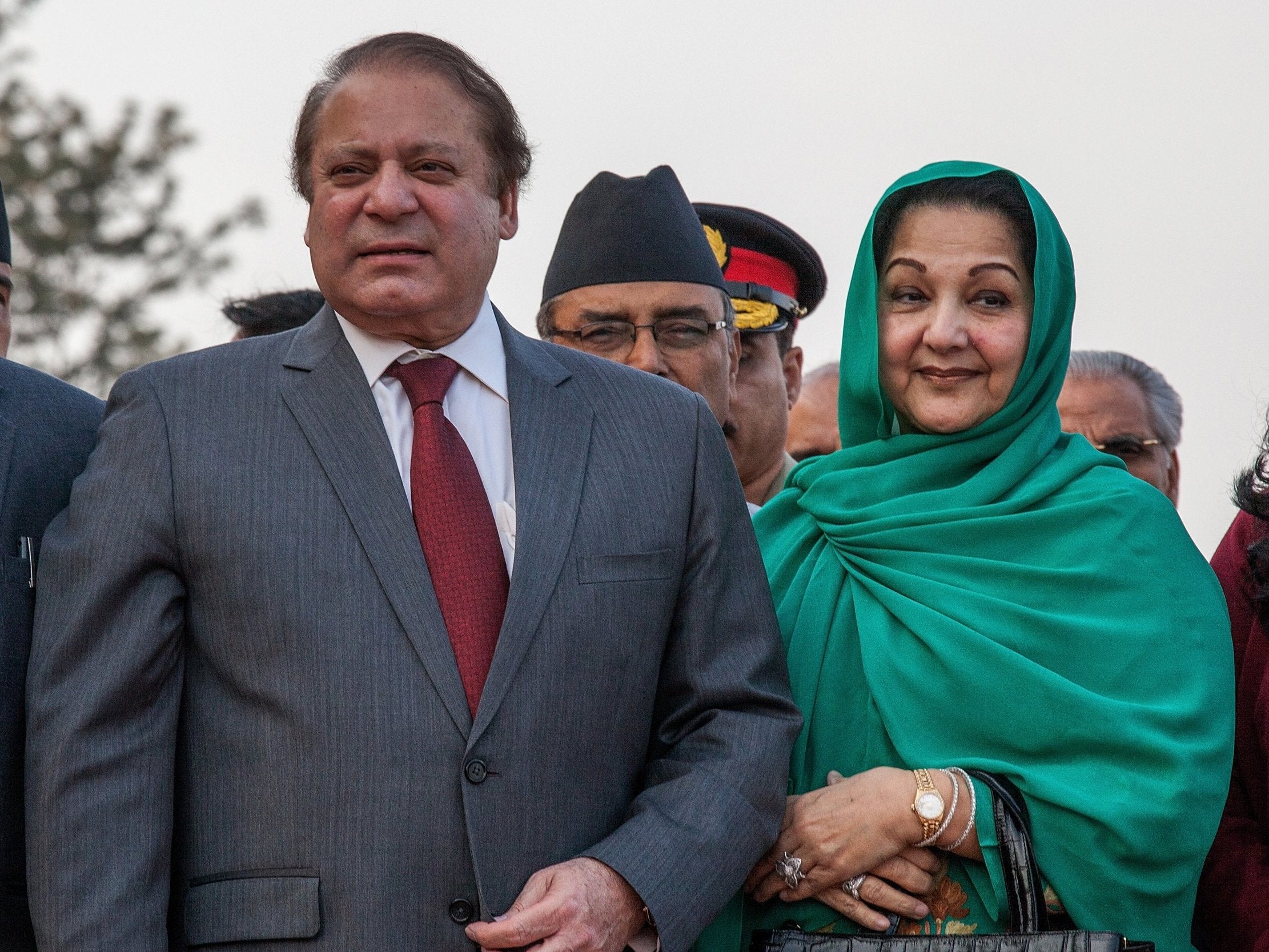Kulsoom Nawaz: first lady who navigated Pakistan's political dramas with three-times PM Nawaz Sharif
The granddaughter of a famous wrestler, she impressed a nation and the world when she stood up to the military dictator who ousted her husband in 1999

Kulsoom Nawaz, wife of former Pakistani premier Nawaz Sharif, was an exceptional first lady by any yardstick. Highly educated, she exerted a formidable influence on her husband and his party the Pakistan Muslim League-Nawaz (PML-N), which was elected for three non-consecutive terms.
In the last few months of her life, however, Nawaz, who was mostly unconscious in hospital in London, was left wondering where her husband and daughter Maryam were.
The former first lady of Pakistan did not know that since July they had been in Pakistan, having been served 11-year and eight-year jail terms respectively on corruption charges – sentences that were suspended shortly after her death.

Sharif and his daughter Maryam had decided to leave London for Pakistan to serve their sentences, fearing that remaining there would make their party irrelevant (the country was holding a general election which was won by their political rival’s Imran Khan’s party with 16.86 million votes to PML-N’s 12.89 million).
They both knew full well they might never see Nawaz again. In an emotional video released on social media after her death, Sharif and his daughter could be seen saying their goodbyes to an unconscious Nawaz prior to boarding a flight to Pakistan.
Nawaz was born Kulsoom Rehana Butt in Lahore in 1950 to Razia Begum and her husband Mohammad Hafeez Butt, a businessman and investor. Hafeez was from a well-known Kashmiri family in the city, while Begum was from a family in Amritsar known for producing wrestlers. She moved to Lahore in 1947. Her grandfather was the legendary wrestler Ghulam Mohammad Baksh, also known as Gama Pahlawan (“Champion Gama”). The couple had another two daughters and two sons.
Nawaz gained a master’s in Urdu literature from the Foreman Christian College and a PhD in philosophy from Punjab University. She married Nawaz Sharif in 1971. He went on to be elected prime minister three times: in 1990, 1997 and 2013.
The couple had four children, but only their daughter Maryam decided to enter politics. It was Nawaz who groomed her to become a future leader and convinced her husband to make their daughter part of decision making processes inside the party.
Nawaz herself preferred to stay out of the volatile politics of Pakistan, choosing to mostly remain behind the scenes. Often, Sharif would choose to take Maryam with him on official trips instead of his wife.
But Nawaz was fully capable of taking charge when needed. Perhaps more than anything she will be remembered for her courageous response to the imprisonment of her husband after his government was overthrown by general Pervez Musharraf. She stepped up to become interim president of PML-N and led protests for his release.
She, along with Maryam and other members of the family, was put under house arrest but, amazingly, managed to give her guards the slip and make her way to lead a rally against the military dictator in Lahore. After a 10-mile car chase, she was stopped by security forces, but refused to surrender for 10 hours. Dramatic photos of her defiantly sitting in her Toyota car as it dangled mid-air from a crane revealed an entirely new side of her to the Pakistani public.
“Kulsoom Nawaz, who only two days ago was flailing in a destructive intra-party storm, is wearing the badge of a lady-leader who can make iron men run for extra security measures,” the newspaper The News reported.
Her daughter Maryam praised her determination, courage and popularity, saying, “My mother has now become a greater leader.”
Some even hailed her as “madare jomhuriyat” – (Mother of democracy).
Nawaz went on to create the Alliance for the Restoration of Democracy, which threatened Musharraf – if his military courts did not put her husband to death it was because of pressure from Riyadh (and a plea for clemency from President Clinton) to which Nawaz Sharif was duly dispatched.
Musharraf made sure that Nawaz was on the plane with him, having already got a taste of what this woman was capable of – along with 22 members of their family they stayed in exile in Saudi Arabia for seven years.
After Musharraf’s rule ended, Nawaz retreated back to wielding silent power inside the party, sometimes helping her husband write his speeches. In 2007, she published a book, Jabar Aur Jomhuriyat (Repression and Democracy).
But in the by-elections of 2017, she stood in for her husband who, as part of the Panamagate investigations, was forced out of his role as prime minister and politics for life on corruption charges related to the ownership of flats in London – these emerged following 2016’s Panama Papers scandal.
This surprised many – it was her daughter who had been expected to formally enter politics. Nawaz won and became an MP, although she was not sworn in.
In the run-up to the general elections in 2018, current prime minister Imran Khan’s supporters accused Sharif’s party of using Nawaz’s illness to gain sympathy votes – some even venturing as far as questioning the credibility of medical reports issued by the private clinic where she was being treated. But her death has now proved these ugly accusations wrong.
Kulsoom Nawaz, Pakistani politician, born 29 March 1950, died 11 September 2018
Join our commenting forum
Join thought-provoking conversations, follow other Independent readers and see their replies
Comments
Bookmark popover
Removed from bookmarks